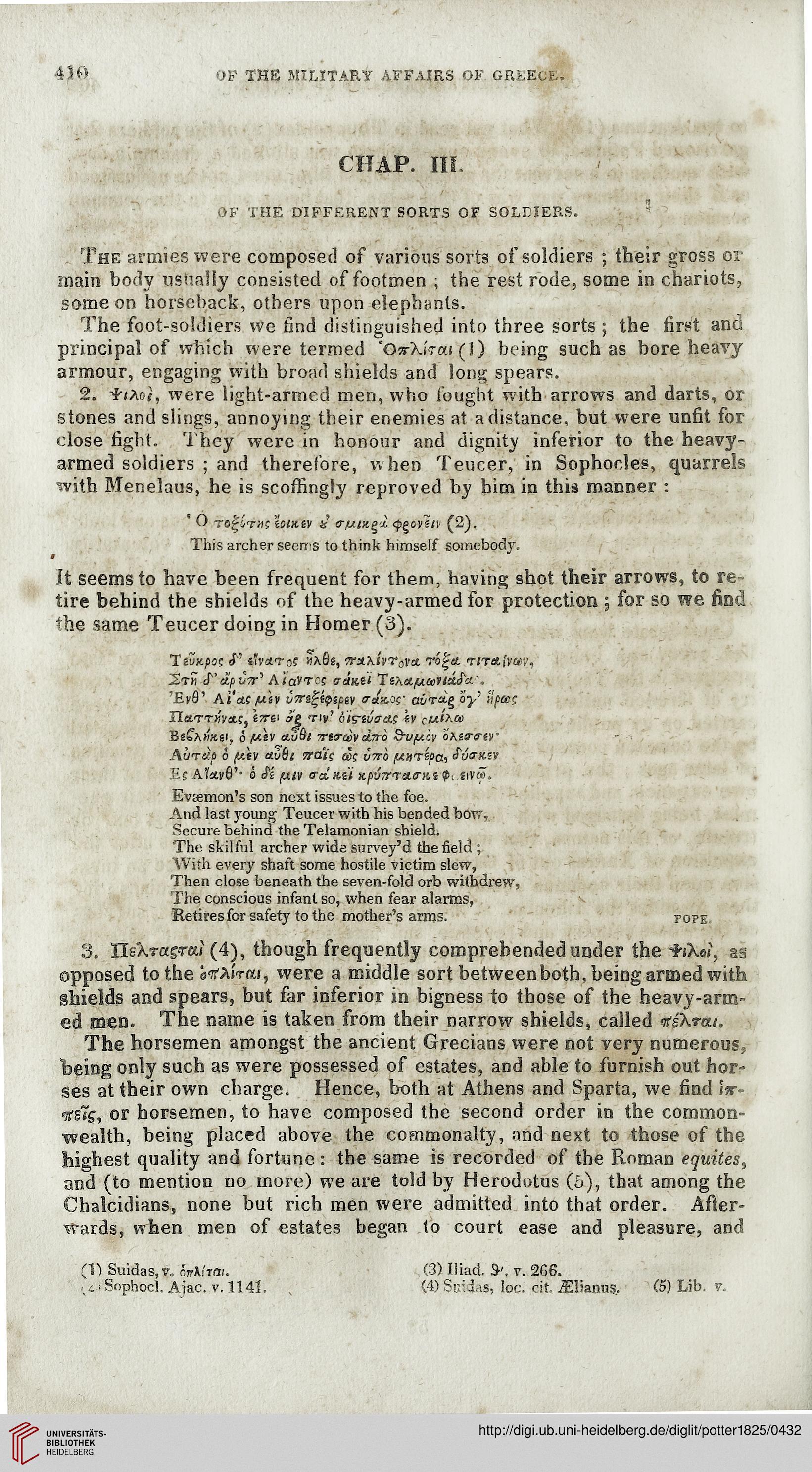4Jf> of the military affairs of greece.
CHAP. in.
of THE DIFFERENT sorts of SOLEIERS.
The armies were composed of various sorts of soldiers ; their gross or
main body usually consisted of footmen , the rest rode, some in chariots,
some on horseback, others upon elephants.
The foot-soldiers we find distinguished into three sorts ; the first and
principal of which were termed 'OsrXi'-Tai (1) being such as bore heavy
armour, engaging with broad shields and long spears.
2. *<Aof, were light-armed men, who fought with arrows and darts, or
stones and slings, annoying their enemies at a distance, but were unfit for
close fight. They were in honour and dignity inferior to the heavy-
armed soldiers ; and therefore, when Teucer, in Sophocles, quarrels
with Menelaus, he is scoffingly reproved by bim in this manner :
This archer seerrs to think himself somebody.
It seems to have been frequent for them, having shot their arrows, to re-
tire behind the shields of the heavy-armed for protection ; for so we find
the same Teucer doing in Homer (3).
2th S'a.pCir'' Ai'avm aiy.it Texa/ucetiaJ'ci .
'EvQ' Ai'aL! /uiy vTrtjZfpipiv Mfcaj: ai/ra-g '6y npwr,
B£?Awcsi, 6 /u-h (tudl Triraivebro Su/ucv oKiwtv
Aurup 6 (Mtv etiiQt Trait co; v7ro [xnTipa-, Sua-Kiy
Ec A?ap6'- 6 Si /uiv a-aunu Kpv7r<ra.(rKi <t>-. sivro.
EvKmon's son next issues to the foe.
And last young Teucer with his bended bow.
Secure behind the Telamonian shield.
The skilful archer wide survey'd the field ;
With every shaft some hostile victim slew,
Then close beneath the seven-fold orb withdrew,
The conscious infant so, when fear alarms,
Retiresfor safety to the mother's arms. pope
3. nsXrajrai (4), though frequently comprehended under the irikot, as
opposed to the 'oirtirou, were a middle sort betweenboth, being armed with
shields and spears, but far inferior in bigness to those of the heavy-arm-
ed men. The name is taken from their narrow shields, called <7tsh*a.t.
The horsemen amongst the ancient Grecians were not very numerous,
being only such as were possessed of estates, and able to furnish out hor-
ses at their own charge. Hence, both at Athens and Sparta, we find \ir-
ts7s, or horsemen, to have composed the second order in the common-
wealth, being placed above the commonalty, and next to those of the
highest quality and fortune : the same is recorded of the Roman eguites,
and (to mention no more) we are told by Herodotus (6), that among the
Chalcidians, none but rich men were admitted into that order. After-
wards, when men of estates began to court ease and pleasure, and
(1) Suidas,v. OTrA/iai.
.,i <Sophocl. Ajac. v. 1141.
(3) Iliad. 3'. v. 266.
(4) Suidag, loc. cit. jElianus, (5) Lib. v.
CHAP. in.
of THE DIFFERENT sorts of SOLEIERS.
The armies were composed of various sorts of soldiers ; their gross or
main body usually consisted of footmen , the rest rode, some in chariots,
some on horseback, others upon elephants.
The foot-soldiers we find distinguished into three sorts ; the first and
principal of which were termed 'OsrXi'-Tai (1) being such as bore heavy
armour, engaging with broad shields and long spears.
2. *<Aof, were light-armed men, who fought with arrows and darts, or
stones and slings, annoying their enemies at a distance, but were unfit for
close fight. They were in honour and dignity inferior to the heavy-
armed soldiers ; and therefore, when Teucer, in Sophocles, quarrels
with Menelaus, he is scoffingly reproved by bim in this manner :
This archer seerrs to think himself somebody.
It seems to have been frequent for them, having shot their arrows, to re-
tire behind the shields of the heavy-armed for protection ; for so we find
the same Teucer doing in Homer (3).
2th S'a.pCir'' Ai'avm aiy.it Texa/ucetiaJ'ci .
'EvQ' Ai'aL! /uiy vTrtjZfpipiv Mfcaj: ai/ra-g '6y npwr,
B£?Awcsi, 6 /u-h (tudl Triraivebro Su/ucv oKiwtv
Aurup 6 (Mtv etiiQt Trait co; v7ro [xnTipa-, Sua-Kiy
Ec A?ap6'- 6 Si /uiv a-aunu Kpv7r<ra.(rKi <t>-. sivro.
EvKmon's son next issues to the foe.
And last young Teucer with his bended bow.
Secure behind the Telamonian shield.
The skilful archer wide survey'd the field ;
With every shaft some hostile victim slew,
Then close beneath the seven-fold orb withdrew,
The conscious infant so, when fear alarms,
Retiresfor safety to the mother's arms. pope
3. nsXrajrai (4), though frequently comprehended under the irikot, as
opposed to the 'oirtirou, were a middle sort betweenboth, being armed with
shields and spears, but far inferior in bigness to those of the heavy-arm-
ed men. The name is taken from their narrow shields, called <7tsh*a.t.
The horsemen amongst the ancient Grecians were not very numerous,
being only such as were possessed of estates, and able to furnish out hor-
ses at their own charge. Hence, both at Athens and Sparta, we find \ir-
ts7s, or horsemen, to have composed the second order in the common-
wealth, being placed above the commonalty, and next to those of the
highest quality and fortune : the same is recorded of the Roman eguites,
and (to mention no more) we are told by Herodotus (6), that among the
Chalcidians, none but rich men were admitted into that order. After-
wards, when men of estates began to court ease and pleasure, and
(1) Suidas,v. OTrA/iai.
.,i <Sophocl. Ajac. v. 1141.
(3) Iliad. 3'. v. 266.
(4) Suidag, loc. cit. jElianus, (5) Lib. v.





